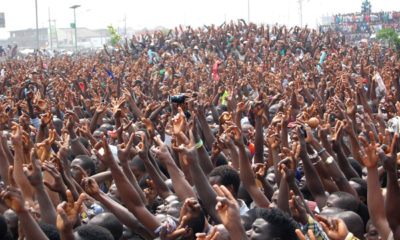- Report: Nigeria’s Rising Population a Ticking Time Bomb
The failure by policymakers in Nigeria to match the rising rate of reproduction with a corresponding level of productivity in the country, “has set the stage for a ticking time bomb,” a report has warned.
Lagos-based investment and financial advisory company, the Financial Derivatives Company Limited (FDC), stated this in its latest bi-monthly economic update obtained yesterday.
While Nigeria recorded Gross Domestic Product (GDP) growth of 1.93 per cent in 2018, the country’s population growth rate is currently at about three per cent.
In fact, the United Nations Population Fund (UNFPA) on Monday stated that Nigeria’s population currently stands at an all-time high of 201 million, representing an increase of 5.1 million from the 195.9 million it said the country had in October last year.
The UNFPA in its 2019 State of the World Population report published on its website, had said the country’s annual growth rate has been at an average of 2.6 per cent from 2010 to 2019.
But the FDC in the report, stressed that Nigeria’s population “is large and growing.”
“According to the United Nations Department of Economic and Social Affairs (DESA), Nigeria’s population is set to more than double by 2050 to reach 400 million and overtake the United States as the third most populated country in the world.
“This forecast of seemingly exponential growth in population is not necessarily a dire development. However, a failure to match the high rate of reproduction with a corresponding level of productivity has set the stage for what is a ticking time bomb.
“The year 2050 may still be more than 30 years down the road from today but Nigeria will not have to wait till then to be faced with the consequences of its population explosion and the lack of adequate infrastructure and development. “Much of it is clear and apparent. Nigeria was recently named the poverty capital of the world – overtaking much larger India, projected to rise sharply as the population boom continues without matching economic growth,” it added.
According to United Nations International Children’s Emergency Fund (UNICEF), the number of out of school children in Nigeria has risen to over 10 million – the largest in the world – even though primary education is free and officially compulsory.
The university system is in dire need of increased capacity as less than 30 per cent of the over 10 million applicants gained admission, the FDC report stated.
For the few that manage to pass through the educational system, rapidly rising unemployment remains a major source of anxiety.
The latest data from the National Bureau of Statistics also showed the unemployment rate has more than doubled since the end of 2015.
It currently stands at 23.1 per cent compared to 10 cent at the end of 2015. This, the report noted was likely to worsen in the years to come as population growth currently exceeds GDP growth.
“This implies that there are more people being born, and in turn, more people joining the laboußr force than there are jobs being created,” it stated.
Continuing, the report pointed out that even the highly educated and skilled Nigerians are not left out of the scramble, “to escape the current economic uncertainty for a better life overseas.” “Canada is the new destination of choice due to its liberal immigration policies. However, this emigrant demographic does present one of the few bright spots for Nigeria.
“Remittances by Nigerians in Diaspora have been on the rise for over a decade now,” it added.
According to PwC, Nigeria has become one of the top five nations with high remittance inflows globally, and the largest remittance-receiving country in Africa.
“Faced with dire employment prospects, Nigerians are fleeing Many Nigerians have left and are still fleeing the country in search of proverbial greener pastures.” According to the world population review, Nigeria has a net migration per day of -164.
“This number means that 164 people emigrate more out of Nigeria than immigrate on a daily basis. “This works out to one net migrant every nine minutes. Many are sold on the promise of a better life and brave terrible odds in an attempt to reach Europe via the Sahara desert and the Mediterranean Sea.
“Sadly, many have ended up in a life of slavery or have become trapped in sex trafficking rings. The number of Nigerian men, women and children being registered at landing points in Italy has risen dramatically in recent years,” the report stated.

 Billionaire Watch2 weeks ago
Billionaire Watch2 weeks ago
 Startups4 weeks ago
Startups4 weeks ago
 News4 weeks ago
News4 weeks ago
 News4 weeks ago
News4 weeks ago
 Bitcoin4 weeks ago
Bitcoin4 weeks ago
 Naira4 weeks ago
Naira4 weeks ago
 Forex3 weeks ago
Forex3 weeks ago
 Treasury Bills4 weeks ago
Treasury Bills4 weeks ago



















